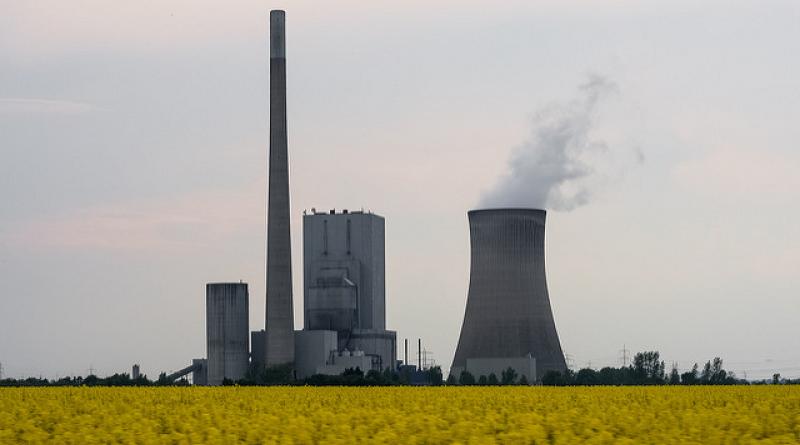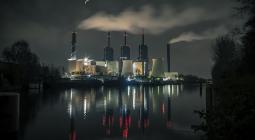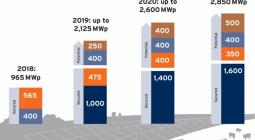Germany suffers more coal-linked deaths than rest of EU.

Germany – home to the much-hailed ‘Energiewende’ green revolution – suffered more premature deaths linked to coal plant pollution than any other EU member state, research by health and environment campaigners has found.
Analysis of 257 of 280 coal-fired power plants in the EU found that their 2013 emissions caused over 22,900 deaths, tens of thousands of illnesses from heart disease to bronchitis, and up to €62.3 billion in health costs.
3,630 people in Germany died from coal-related illnesses in 2013, according to the report by the Health and Environment Alliance, Climate Action Network Europe, WWF European Policy Office and Sandbag.
1,860 deaths were traced to coal plants in Germany, which is moving to a low-carbon energy system. The Energiewende (energy switch-over) will require the retirement of most, if not, all coal powered generation in Germany.
The remaining 1,770 premature deaths were traced to pollution caused by coal plants in other EU countries. Polish pollution claimed 630 of those lives, the research claims.
Germany buys cheap coal-fired energy from Poland to pick up the slack left by the abandonment of nuclear power after the Fukushima disaster.
But its domestic coal is also responsible for deaths in other member states, according to the report Europe’s Dark Cloud.
Germany is one of the top five countries whose coal power plants cause the most harm abroad. Poland causes 4,690 premature deaths abroad, Germany 2,490, Romania 1,660, Bulgaria 1,390 and the UK 1,350.
*watch the video here
No borders
“The burning of coal has a huge impact on human health not only in their own countries but also their neighbouring ones, said Wendel Trio, director of Climate Action Network Europe.
“Whether countries are part of the EU or not, coal pollution recognises no borders.”
By phasing out coal, Germany could avoid 1,860 premature domestic deaths and nearly 2,500 more abroad.
The countries suffering the highest toll of premature deaths from foreign and domestic emissions are Germany, the UK (2,100), Poland (1,860), Italy (1,610), and France (1,380).
Only 50 premature deaths in France in 2013 could be traced to domestic coal-fired plants. The remaining 1,330 were cross-border, the majority from German plants.
“The report underlines the high costs to health that come with our reliance on coal power generation and it debunks the myth that coal is a cheap energy source,” said Anne Stauffer, deputy director of Health and Environment Alliance.
“Clearly no country on its own can solve the problem of air pollution from energy production.”
“There is no Brexit from air pollution,” said Imke Luebbke, of WWF. “The report shows that the UK has an interest in finding a common approach to air pollution.”
The UK’s planned coal phase-out, confirmed before the referendum vote, could save up to 2, 870 lives a year, including more than 1,300 in continental Europe.
EU policymakers are currently revising the Industrial Emissions Directive, which commits member states to curb and control such emissions.
As well as the health impact, burning coal is also bad for the climate. World leaders agreed in Paris last December to cap global warming to no more than two degrees above pre-industrial levels.
“Coal will need to be phased out and phased out much more rapidly to meet the EU’s climate commitments,” said Trio.
Winter is coming
But Euracoal, the lobby association for the coal industry, said the report used outdated data to calculate the health impacts and ignored improvements made since 2000.
Brian Ricketts, Euracoal’s secretary general, said, “In my lifetime, the average life expectancy of citizens in OECD countries has risen by ten years to 80 years. At the same time, coal consumption in OECD countries has risen.
“Despite these facts, HEAL presents a bleak picture of premature deaths caused by coal – not actual deaths but statistical deaths. HEAL does not examine the other side of the coin – the benefits that energy use brings to society. “
He added, “Everything that we do and enjoy can be traced back to the use of energy. Whilst large theoretical environmental costs can be calculated for all energy sources, they need to be balanced against the actual benefits of energy use.
“For example, at the most basic level, unless one is able to keep warm during the winter in Europe, then death is not a statistical possibility – it is a certainty.”
Euractiv





